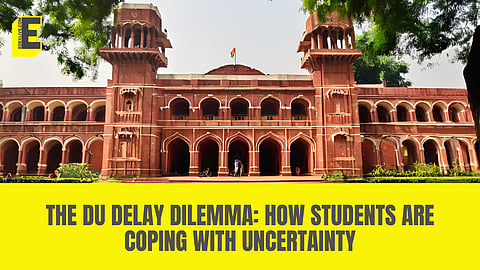

Each year, Delhi University (DU) draws lakhs of eager students from across the country, all vying for a place in one of India’s prestigious institutions.
However, delays have sparked widespread frustration and anxiety among applicants, many of whom find themselves caught in uncertainty.
In recent years, the introduction of the Common University Entrance Test (CUET) and its subsequent evaluation processes have pushed the DU admission calendar far beyond traditional timelines.
While many universities begin classes by July or August, DU applicants often find themselves waiting well into October to know their fate.
The delay, largely attributed to CUET result processing, centralised counselling, and administrative bottlenecks, has left students in a state of uncertainty, as they are unable to plan academic, relocation or even personal schedules.
In response, students adopt a range of coping mechanisms. A few enroll for online courses, others take up backup admissions in private universities, and many remain torn between hope and anxiety.
EdexLive spoke to a few students who shared their candid experiences of navigating this year’s prolonged admission timeline.
Students are caught in the wait. “I applied as soon as the application portal opened in June,” shared Vansh Modi, reflecting the enthusiasm many students feel when aiming for DU. Similarly, Vidhi Kapur applied without any delay, while Yashika Agarwal submitted her application in early July 2024.
Given the unpredictable timeline, many applicants opted to secure seats elsewhere as a precaution.
Vansh applied to private universities, while Vidhi had an admission offer from Christ University. Both eventually cancelled these options, choosing to wait for DU. They had to face a financial burden, which caused stress, but Vidhi managed to get a refund from the deposit she had made to secure her seat.
Either way, the financial implications go beyond fees. “The extra expenses for backup admissions added a burden,” Vansh said. Yashika observed that the uncertainty “has caused a lot of stress back at home.”
Another common issue for outstation students is relocation planning. Vansh shared how the delay made it difficult to finalise accommodations.
Yashika admitted to continuously postponing her packing and travel plans. In contrast, Vidhi, a Delhi resident, didn’t face such issues.
A few students chose to utilise the wait by engaging in short-term courses. Vansh enrolled for a digital marketing programme while Yashika joined Spoken English classes to use her time wisely.
The delays prompted moments of doubt among students. “At times, yes, but I still believe it’s worth the wait,” said Vansh, while Yashika confessed she questioned her choice, especially when her friends started college elsewhere.
When asked whether DU feels like a dream or a risk, all of them agreed that it is, in the end, a dream, but it remains one that tests both patience and resilience.
To students contemplating DU but hesitant, Vansh advised, “Have a Plan B, but don’t give up on DU if it’s your goal.” Vidhi encouraged, “Life is uncertain, but whatever happens will be for the best — so just go apply.”
For many, Delhi University remains a beacon of opportunity, but not without its challenges. The voices of these students reveal the resilience and clarity today’s students bring, even in the face of systematic delays.
Their experiences serve not only as a depiction of the current frustrations but also as a testament to the hope and ambition that continue to drive India's youth forward.
